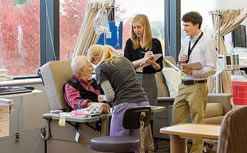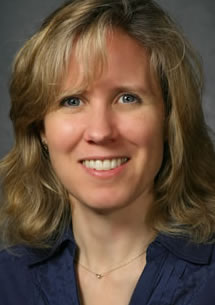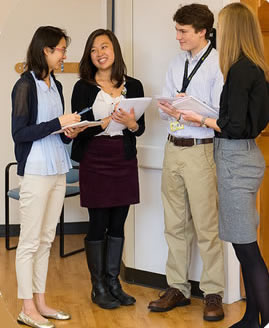Method of Operation

Photo credit: Edda Pacifico
The Rogel Cancer Center Teams up with Engineers to Improve your Patient Care Experience
As a nationally designated comprehensive cancer center and part of a world-class health system, the University of Michigan Rogel Cancer Center is a big place. Our patients have high expectations, not only for positive health outcomes, but also for their personal experiences receiving care here. And rightly so! Creating the ideal patient care experience is at the core of Michigan Medicine’s mission. It only makes sense for the Rogel Cancer Center to live up to its reputation.
That's why the center partners with industrial engineers to review -- step by step -- how a patient travels through our system. Together, they look for kinks in the system, places where a patient's experience could be better, faster or more efficient. Additionally, the Rogel Cancer Center is financially invested in improving the system and has hired an engineering master's student part-time.

We sat down with Amy Cohn, Ph.D., associate director at the U-M Center for Healthcare Engineering and Patient Safety (CHEPS), to talk about her expertise in large health care settings and how multidisciplinary teams of students, faculty, and caregivers are working to implement positive change for our patients.
Q: How is the Center for Healthcare Engineering and Patient Safety (CHEPS) qualified to help improve care at the Rogel Cancer Center?
Our program has students ranging from undergraduates to doctoral candidates working hand-in-hand with caregivers in the Rogel Cancer Center. What is valuable is that the students have strong technical skills; we're the No. 2 industrial engineering program in the country. When you take these strong technical skills and put them in the health care setting along with patients and caregivers, real improvements can be made. The partnership between the Rogel Cancer Center and CHEPS is extraordinary because we are learning from a network of collaborators with various backgrounds.

Photo credit: Edda Pacifico
We focus on real problems that affect our patients, conducting hands-on projects with immediate and measurable impact. Our expertise is taking complex systems, studying how they work and making the parts fit together better.
Q. What specific issue are the engineers working on to improve at the Rogel Cancer Center?
Because we know infusion is a complex part of the center, our current goal is to reduce delays to infusion patients while maintaining safe, high-quality care. We're looking at all aspects of infusion, which gives a lot of avenues to explore. By evaluating steps in the process, such as waiting for blood work, mixing medication and how patients are scheduled, our data tells where there are bottlenecks and how we might change things to make patients happier with the overall process.
Q. You mentioned data. What does that have to do with improving patient care?
Engineers do very technical work. We build computer programs to show patient flow, take time measurements at each step, and talk about specific patient circumstances that add variability.
This lets us help caregivers understand how delays occur. As a result, we can reallocate resources, change the way patients receive blood work, or schedule patients differently. We can show with computer simulation where problems arise, shine light on it and address how to fix it.
Q. How do engineers take into account the human element of health care and that our goal is to treat patients, rather than something like build cars?
A key part of CHEPS’ mission is to train future generations of engineers specifically interested in health care. By working side by side with physicians, other care providers and in consultation with Patient and Family Advisory Board members, these engineers take into account the actual patient and the ideal patient experience.
Read the Winter, 2015 issue of Thrive.
